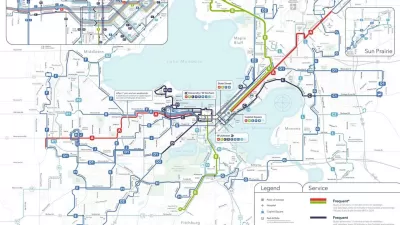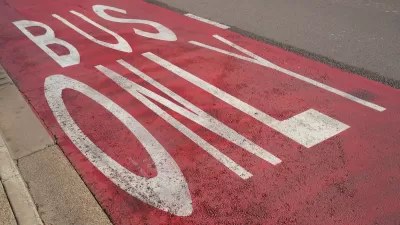Some portions of the bus rapid transit (BRT) system planned for Madison, Wisconsin will resemble the fully realized BRT systems more common in other parts of the world.

"Madison’s proposed $160 million Bus Rapid Transit system may run its special buses on dedicated center lanes with boarding stations on medians on some of the city’s main thoroughfares," reports Dean Mosiman from Wisconsin.
The center lane would only be built on some portions of the BRT route, according to Mosiman, wile other stretches would run on side lanes while mixing with car traffic. The dedicated center lanes, proposed for "Blair and Milwaukee streets and other stretches of East Washington Avenue on the East Side and on Whitney Way and Mineral Point Road on the West Side," would deliver more consistent service while also preserving bike lanes and street parking on those stretches, according to the article.
Back in March, the Madison City Council and the Greater Madison Area Metropolitan Planning Organization approved a preferred alternative route for the line, which will include 27 stations served by five- to 15-minute headways running from 5 am to midnight on weekdays, and 15- to 30-minute headways from 7 am to 11 pm on weekends.
"About 83,000 residents would live within a half-mile of stations, while about 110,000 jobs would be within that distance," according to Mosiman.
Madison Metro Transit planners are making refinements to the plan while waiting for approval for $107 million in federal money toward the total $160 million needed for the project.
FULL STORY: Madison may push Bus Rapid Transit system to center lanes

Maui's Vacation Rental Debate Turns Ugly
Verbal attacks, misinformation campaigns and fistfights plague a high-stakes debate to convert thousands of vacation rentals into long-term housing.

Planetizen Federal Action Tracker
A weekly monitor of how Trump’s orders and actions are impacting planners and planning in America.

In Urban Planning, AI Prompting Could be the New Design Thinking
Creativity has long been key to great urban design. What if we see AI as our new creative partner?

King County Supportive Housing Program Offers Hope for Unhoused Residents
The county is taking a ‘Housing First’ approach that prioritizes getting people into housing, then offering wraparound supportive services.

Researchers Use AI to Get Clearer Picture of US Housing
Analysts are using artificial intelligence to supercharge their research by allowing them to comb through data faster. Though these AI tools can be error prone, they save time and housing researchers are optimistic about the future.

Making Shared Micromobility More Inclusive
Cities and shared mobility system operators can do more to include people with disabilities in planning and operations, per a new report.
Urban Design for Planners 1: Software Tools
This six-course series explores essential urban design concepts using open source software and equips planners with the tools they need to participate fully in the urban design process.
Planning for Universal Design
Learn the tools for implementing Universal Design in planning regulations.
planning NEXT
Appalachian Highlands Housing Partners
Mpact (founded as Rail~Volution)
City of Camden Redevelopment Agency
City of Astoria
City of Portland
City of Laramie





























